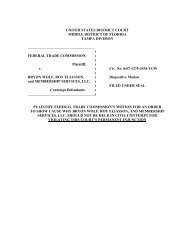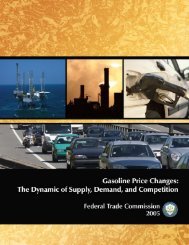Complaint Counsel's Post Trial Brief - Federal Trade Commission
Complaint Counsel's Post Trial Brief - Federal Trade Commission
Complaint Counsel's Post Trial Brief - Federal Trade Commission
You also want an ePaper? Increase the reach of your titles
YUMPU automatically turns print PDFs into web optimized ePapers that Google loves.
Respondents' claims are materal because they contain information concerg the purose,<br />
effcacy, and perormance of the DCO Products that would likely affect a consumer's choice to<br />
purchase these products.<br />
IV. THE FTC is NOT VIOLATING THE RESPONDENTS' FIRST AMENDMENT<br />
RIGHTS<br />
A. The Filg of<br />
the Instant Suit Does Not Infringe Respondents' First<br />
Amendment Rights<br />
Thoughout ths proceeding Respondents have argued that their adverising<br />
representations are constitutionally protected religious and political speech that is immune to the<br />
FTC Act's prohibition agaist unfai and deceptive practices. Respondents fist raised their First<br />
Amendment arguent in their Januar 13, 2009 Motion to Dismiss. The Cour dened<br />
Respondents' Motion to Dismiss in its Februar 2,2009, Order, and stated:<br />
The <strong>Complaint</strong> contains suffcient allegations that respondents are engagig in<br />
deceptive commercial speech, including allegations that the Respondents promote<br />
and adverise the Challenged Products, that the Challenged products are offered<br />
for sale at not insignficant prices, and that the adverisements refer to specific<br />
products and attbutes. These allegations, and the content of the exhbits to the<br />
Complait, are more than suffcient for a reasonable fact-fider to infer that the<br />
speech proposes a commercial transaction, refers to specific products and is<br />
economically or commercially motivated. Respondents point to no facts that<br />
would dispute such an inference.<br />
Feb. 2 Order at 8 (citing<br />
In re R.J. Reynolds, 1998 WL 490114, *4 (1998)). The Cour explained<br />
that commercial speech - speech proposing a commercial transaction - that is false or misleading<br />
can be suppressed, and that "(t)he more limted protection accorded commercial speech perits<br />
the FTC to act when necessar to challenge false or deceptive adverising." Feb. 2 Order at 7<br />
(citing<br />
In re R.J. Reynolds, 1998 WL 490114, *4 (1998)).<br />
At tral, Respondents failed to adduce any facts to dispute that their representations<br />
constitute commercial speech. The evidence at tral clearly demonstrated that the challenged<br />
32

















